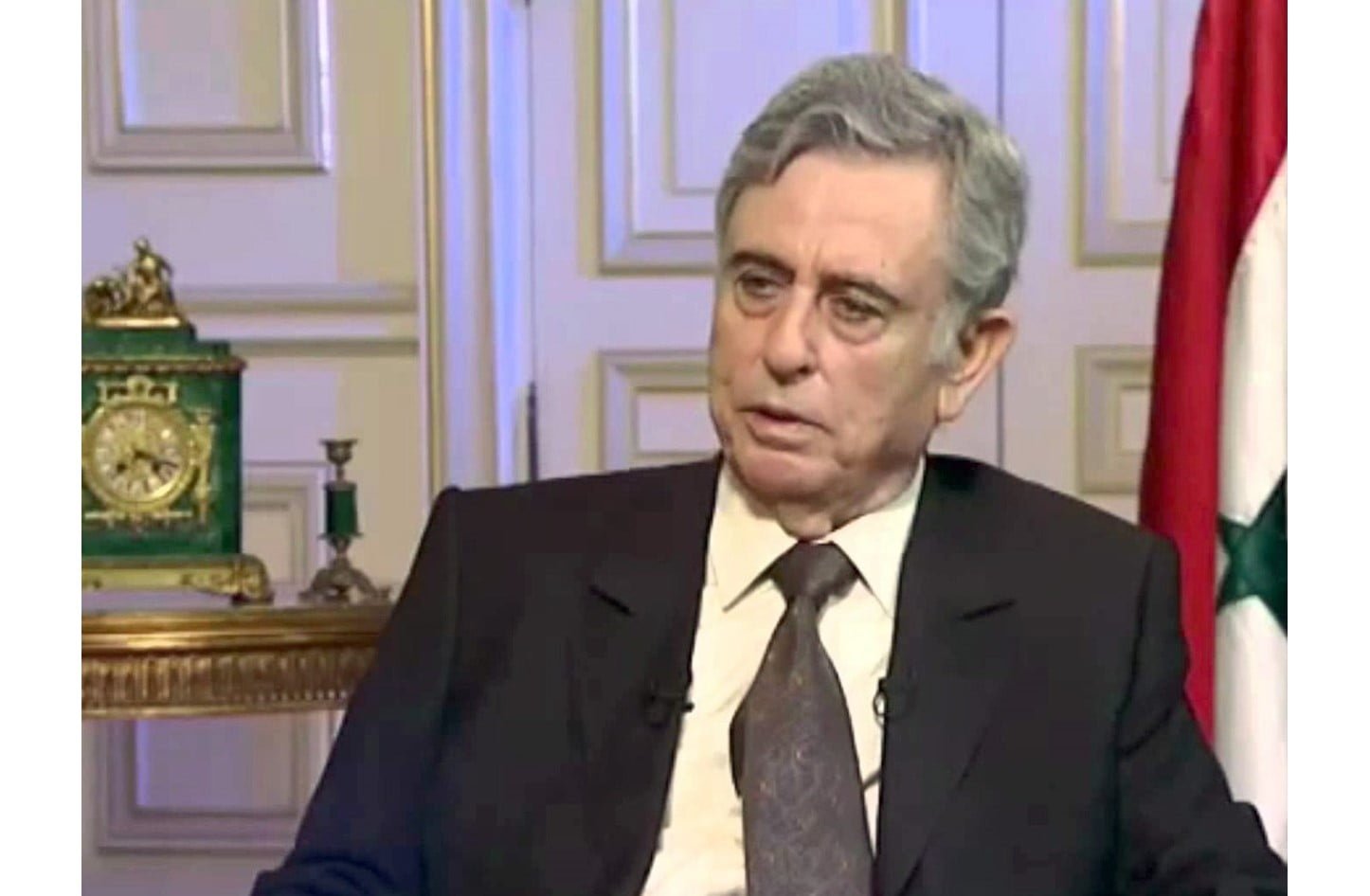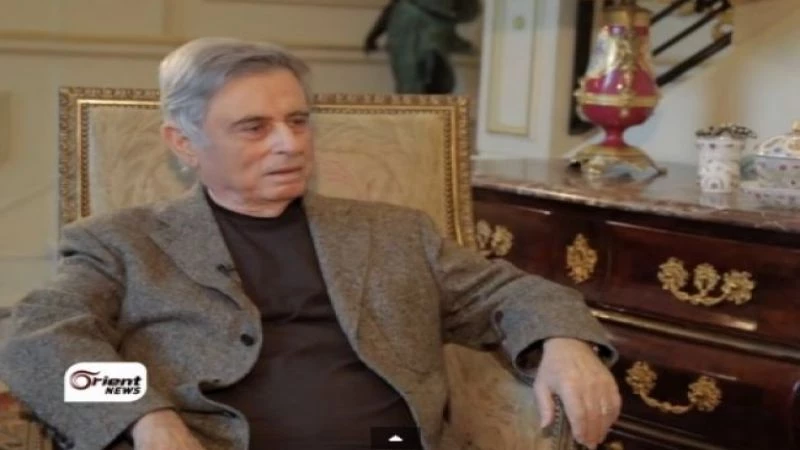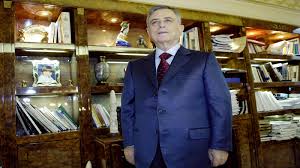He fully recalled the Syrian political memory, in front of “Okaz,” and delved into the memories of his political past. He turned the pages of Syria’s unknown history over the course of three decades. He opened the file of the famous Hama events and revealed the hidden truths in these events. Syrian Vice President who defected since 2005, Abdul Halim Khaddam, speaks to “Okaz” about the era of Hafez al-Assad.
In his lengthy conversation, Khaddam defended his peaceful role in the Brotherhood events, revealing that the issue of transferring the Hamawi teachers to Deir ez-Zor was what triggered the Hama uprising in 1982. He emphasized that he tried by all means to prevent the use of force.
Delving into the political history of Hafez al-Assad, Khaddam affirmed that Hafez wasn’t his creation and that he saved him from many mistakes during his time as Foreign Minister. He pointed out that he worked with some individuals to strengthen Hafez’s rule, as he was weak at the beginning of the coup against power in 1973. To the details:
Are you ready to delve into the Syrian memory without erasing some of its pages?
As for my historical journey, it is recorded in my memoirs that I have finished writing and are ready, just waiting for someone to take them up and bring them to light. Since I opened my eyes to politics, since 1947… all the events, whether witnessed or participated in, are faithfully recorded in my memoirs… and I find no objection in them being brought to the public and revealing many truths with historical honesty.
Even those in which you were involved and were a perpetrator over three decades?
If anyone has compelling evidence of my involvement in cases of corruption, theft, murder, or even suspicious political decisions, I affirm from this platform that I am ready for trial after the fall of Bashar al-Assad’s regime… I was Vice President under Hafez al-Assad, and afterwards I was close to his son, but the ultimate decision was in the hands of the head of state, whether during the reign of the elder Assad or the younger Assad. Whoever possesses files against me, let them present them to justice… and we shall see…
Hama Uprising
You were the governor of the city of Hama, which witnessed the largest historical uprising, and it is said that you contributed to suppressing the protesters. What is the truth about the Hama uprising?
The direct and real reason for the Hama uprising was the decision of the Minister of Education at that time to transfer teachers from the city of Hama to Deir ez-Zor in the middle of the school year, following protests against the arrest of a student who wrote a comment in one of the schools saying, “There is no rule but God’s.” Another student responded, “There is no rule but the Ba’ath Party’s.” The authorities arrested the student, and this led to a protest movement that resulted in the transfer of teachers far away from their families. They couldn’t provide for themselves and their families… On that day, I raised a memorandum to the government, demanding that they postpone the transfer of teachers until the end of the school year, and close the schools temporarily, and then transfer them as part of the general reshuffling to avoid problems. I met with the Minister of Interior that day, and he was convinced of the idea and said, “Discuss this with Prime Minister General Muhammad Imran.” I indeed discussed the matter with him, and he was convinced of the idea, and he told me, “I will request a leadership meeting and present the issue to them.” A meeting was held with the leadership, but they rejected the idea and didn’t backtrack on their decisions.
The next day, I was informed by Prime Minister General Muhammad Imran that the leadership refused to reverse their decisions. I told him, “The explosion is imminent in Hama.”
You sought to contain the tension, but you were also part of a team that managed the crisis with an iron grip?
Of course, I worked with the President of the State, the Prime Minister, and the Deputy Secretary-General of the Party. I submitted a memorandum to them, met with them, and explained the whole situation because I was the governor of the city of Hama and I knew very well the composition of society and how people think. I anticipated this happening because before the explosion, there was tension in the city two days or more before, and there was a complete city-wide strike. The outcome was that explosion.
After that, following the explosion, the President of the State, the Minister of Interior, and the Deputy Secretary-General of the Party came, and they took over the crisis management. I wasn’t part of the crisis management team. I tried to prevent what happened through peaceful means, and I was not successful because the higher leadership didn’t listen to my opinion or the solutions I proposed. They chose to proceed with their decisions, which gave an opportunity for the explosion to occur, and what happened, happened, and Hama was bombarded.
The Shadow Man
Were you the shadow man who planned Assad’s victories over his opponents from his early beginnings?
The man was from my city, Banias, and we knew each other well… In the stage before Hafez al-Assad’s rise to power, my political role was limited to party activities within the Socialist Ba’ath Party. After Hafez al-Assad came to power, and I had a fundamental role in his rise, I assumed the position of Vice President.
Yes, I saved Hafez al-Assad from many pitfalls, and I was an architect of his politics. He didn’t make Abdul Halim Khaddam politically; I was already experienced in politics. I used to meet with some military leaders to discuss matters and find solutions. When the coup took place in October 1970, Hafez al-Assad was defeated and isolated, but we managed to tip the scale in his favor. I and two party leaders, Mohammed Haydar, a member of the interim leadership, and another officer from the army, gathered and devised a plan to rectify the situation. By doing so, we strengthened Hafez al-Assad’s grip and tilted the balance in his favor.
How did you play a fundamental role in his rise to power?
The party was extremely strict and held rigid ideologies. If someone criticized, they were accused of being reactionary. Conversely, within the same party, there was a group of influential Ba’athists with varying levels of ideology, leaning towards reformist ideas. They believed that pressuring the people in such a way was counterproductive, especially since the party advocated “The people are the source of authority.” So how could the people be the source of authority while they were oppressed? Hafez al-Assad adopted this line of thinking, and we supported and endorsed it among the party’s leadership because the conflict was at its peak among these leaders.
Does that mean that because Assad adopted such ideas, he planned a coup against him?
Hafez al-Assad held the same ideas embraced by a group of leaders and officers, so he sought a corrective movement that would steer the political course within the authority. An extraordinary conference of the Ba’ath Party was held, with the goal of isolating Hafez al-Assad from power by the leadership, i.e., attempting a coup against him through the party’s national conference.
Salah Jadid
Did Salah Jadid represent a strong political challenge to Assad?
Yes, Salah Jadid had political influence within the party and the government. The two most powerful figures were Hafez al-Assad, who held the positions of Minister of Defense and Air Force Commander, and Salah Jadid, who served as the Assistant Secretary-General of the party.
Did Hafez al-Assad perceive Salah Jadid as a threat?
Hafez al-Assad had a firm grip on the military and intelligence apparatus, while Salah Jadid penetrated the governance with a network of relationships through his position at the helm of the party. A strong rivalry emerged between Jadid and Hafez al-Assad. Their conflict revolved around who would control the state and military apparatus. The crisis between them persisted. In 1970, an extraordinary national conference was convened. Hafez al-Assad took all necessary precautions to prevent any coup attempt and to maintain control over his political adversaries both internally and externally. Nevertheless, the outcome turned against Assad’s favor, and he was completely sidelined during the conference. They decided to remove him from the position of Minister of Defense. Meanwhile, Salah Jadid garnered the support of the majority of conference participants. However, matters eventually shifted back in Assad’s favor, and he regained control. Many of his opponents fled Syria.
The National Conference
Was the explosion of the National Conference and the withdrawal of the Qatari leadership part of what you and Hafez al-Assad planned?
No, when the National Conference exploded, the Qatari leadership withdrew from the conference, and the Arab leaders present at the conference left for Lebanon. The Prime Minister resigned from the government, leaving the country without a government. The President was aligned with the government and remained at his residence. At that point, we convened with Hafez al-Assad and agreed to proceed with the changes. We decided to form a new temporary leadership to manage the party and create a new government. We chose an individual as the temporary head of state, and an announcement was made about the formation of the interim leadership, with Hafez al-Assad named as the Prime Minister.
Cunning and Calmness
The announcement was formulated, and I was part of the government team. Was it a reward from Hafez al-Assad for your loyalty to him?
Rather, it’s recognition of my role in handling matters with cunning and calmness…
Afterward, when we gathered and formed the government, I was appointed Deputy Prime Minister and Minister of Foreign Affairs. At that point, I assumed the responsibility of managing foreign policy and was directly accountable for it. However, I didn’t make decisions on significant issues in isolation; I used to consult with the President, and then we would convene with the Qatari leadership to discuss them.
The Only Sunni
Were you the only Sunni close to Assad?
No, I wasn’t the only Sunni in the government; in fact, the majority were Sunni. However, I was the only influential Sunni in Hafez al-Assad’s decision-making process. The problem that emerged afterward was that the party divided after the events of November, with some supporting us and others siding with the previous leadership. When we chose an interim Qatari leadership, it practically came from the second and third ranks within the party. This led to differences in terms of experience and expertise. A new generation emerged in leadership and governance. There were challenges and setbacks, which is natural under these circumstances.



